Hong Kongers have a passion for Hong Kong food that eclipses their love for politics, shopping, gambling, and even – gasp – stocks.
The city is home to some of the most food-obsessed people in the world and produces an extraordinary array of food items ranging from the stubbornly traditional to unselfconscious fusion foods, each more drool-worthy than the next.
Here is a selection of 40 Hong Kong food items we love so much that we’d rather not live than live without:
1. Fishballs
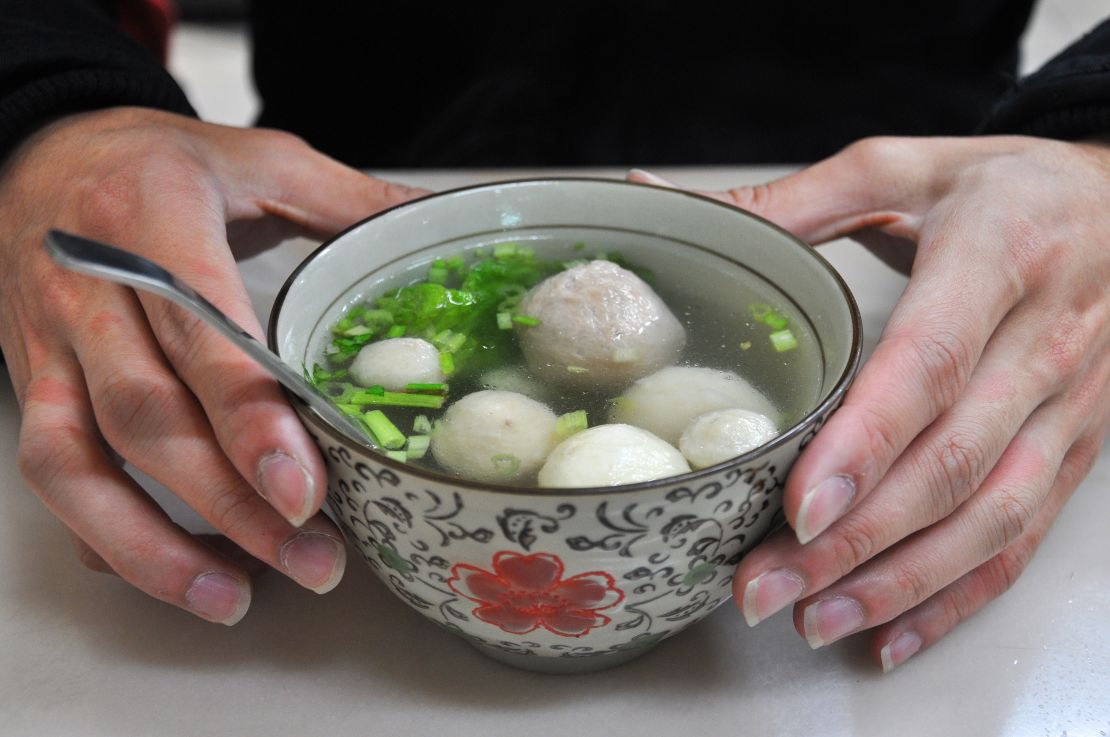
Hong Kongers eat millions of these compressed fish-meat snacks every day. And with a stall stewing fishball skewers in almost every 7-Eleven in the city, they’re as ubiquitous and as accessible as that other classic Hong Kong snack, siu mai dumplings.
Everyone has their own favorite fishball joint, and ours is Tung Tat for their firmness and intense curry flavor.
Tung Tat Restaurant, G/F, 172 Fa Yuen Street, Mong Kok, +852 2392 3043.
2. Scrambled egg sandwich
On paper, an egg sandwich doesn’t sound noteworthy. After all, it’s just cooked egg in between two pieces of soft white bread.
No big deal, right?
Ah, but that would ignore the genius of a good Hong Kong line cook, who can somehow turn an egg into a fluffy, finely-layered gem of stomach-warming goodness. A classic egg sandwich should be plump, full of eggy flavour and light, not greasy.
Most people swear by Australia Dairy Company, 47 Parkes Street, Jordan, +852 2730 1356, but our favourite is Kwong Sing Café, 10 San Shing Avenue, Sheung Shui, +852 2670 4501.
3. Stinky tofu
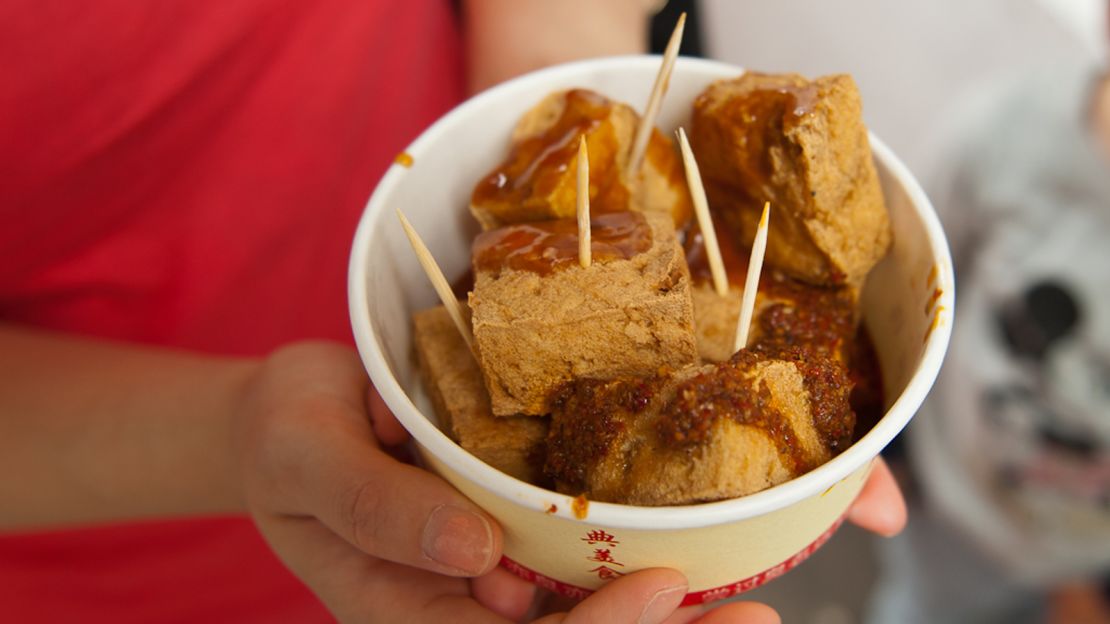
No doubt you will have heard or read about the stench emanating from one of the strangest foods to come out of this part of the world.
But nothing can really prepare you for the stink. Smelly tofu, like durian, is one of Asia’s most iconic “weird foods.”
The stench is a result of fermentation of the tofu and it is such an overpowering smell you’ll be hard-pressed to shake it off for months to come. But Hong Kongers really love that stink. Well, most Hong Kongers.
Follow your nose to Delicious Food, Shop 10, G/F, 30-32 Nullah Road, Prince Edward, +852 2142 7468.
4. ‘Pineapple’ bun
The boh loh baau (literally meaning “pineapple bun”) is the holy grail of what may generously be termed the Hong Kong school of baking.
It’s firm on the outside, soft on the inside and topped with crunchy, sugary pastry. Popular enough to have been exported around the world – step into a Chinese bakery in Toronto, Taipei or Tianjin and you’re likely to find one – it’s ubiquitous in Hong Kong.
It’s the perfect complement to milk tea, especially if you have it with butter, a variation known as boh loh yaau.
Try it at two Mongkok cafes that are known for their buns: Kam Wah, 47 Bute Street, Mongkok, +852 2392 6830 and Hong Lin, 143 Tung Choi Street, Mongkok, +852 2391 8398.
5. Cha siu baau
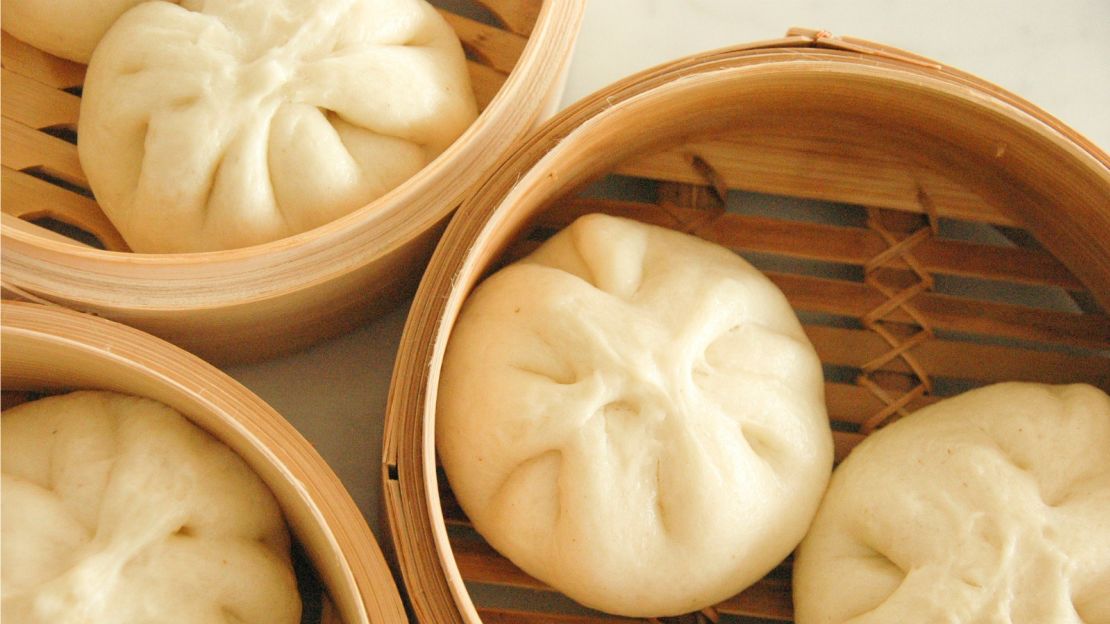
Barbecued pork stuffed into a bun deserves its very own shout-out here. Because, when we break open a soft white steamed bun and see the glistening mauve filling of diced cha siu with extra barbecue sauce spilling out and sniff the heady perfume of wine, soy, and hints of caramel, we’re moved. North Garden calls theirs “cha siu mantou,” giving the traditional bun a northern Chinese twist.
North Garden Restaurant, 1-2/F, Tung Ning Building, 249-253 Des Voeux Road, Sheung Wan, +852 2739 2338.
6. Miniature wife cakes
Much as we love traditional Chinese pastries, their heavy combination of lard and sweet pastes made from various beans and roots don’t exactly make for easy snacking.
Luckily, Hang Heung has come up with a solution to that problem: miniature wife cakes. Wife cakes have a flaky skin made from pork lard and a firm, chewy filling made with almond paste and winter melon.
The combination of the pastry and mellow winter melon sweetness makes them particularly tasty, while their bite-size makes them particularly digestible.
Hang Heung, 64 Castle Peak Road, Yuen Long, +852 2479 2141
7. Hong Kong-style French toast
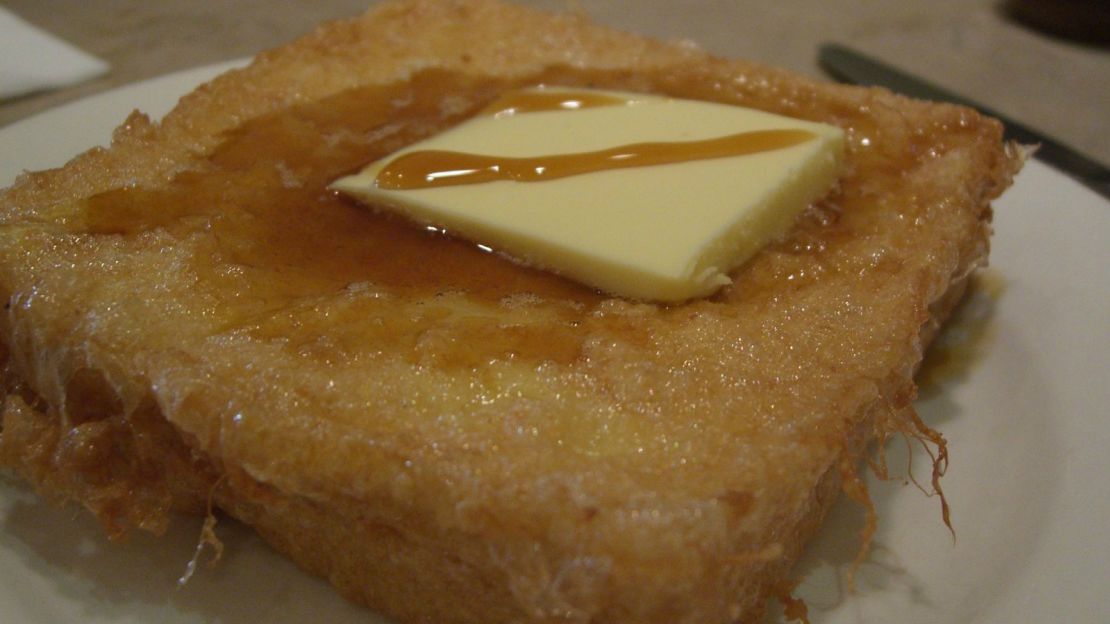
Unlike its more restrained Sunday brunch counterpart, Hong Kong-style French toast is for when you’re stressed out and looking for a warm, deep-fried hug.
It’s two pieces of toast slathered with peanut butter or kaya jam, soaked in egg batter, fried in butter and served with still more butter and lots of syrup. Too much of this will send you to an early grave, but it’s the perfect comfort-food combination of simple flavors and textures: sweet and savory, soft and crispy.
Try it at Lan Fong Yuen, 6 Gage Street, Central, +852 2850 8683.
8. Sweet tofu soup
Sweet tofu soup is one of those deceptively simple Hong Kong dishes whose potential for satisfaction far outweighs the complexity of its ingredients.
One of the best places to try it is Kin Hing, a lean-to stall in the countryside of Lamma Island that is run by an elderly couple who serve nothing but “dau fu faa.”
It’s smooth and soft, doused in a lightly sweet syrup and sprinkled with yellow sugar; the sharp sweetness of the sugar complements the musty soya flavor of the tofu.
To get there, walk from Yung Shue Wan towards Hung Shing Yeh “Powerplant” Beach.
9. Chicken feet
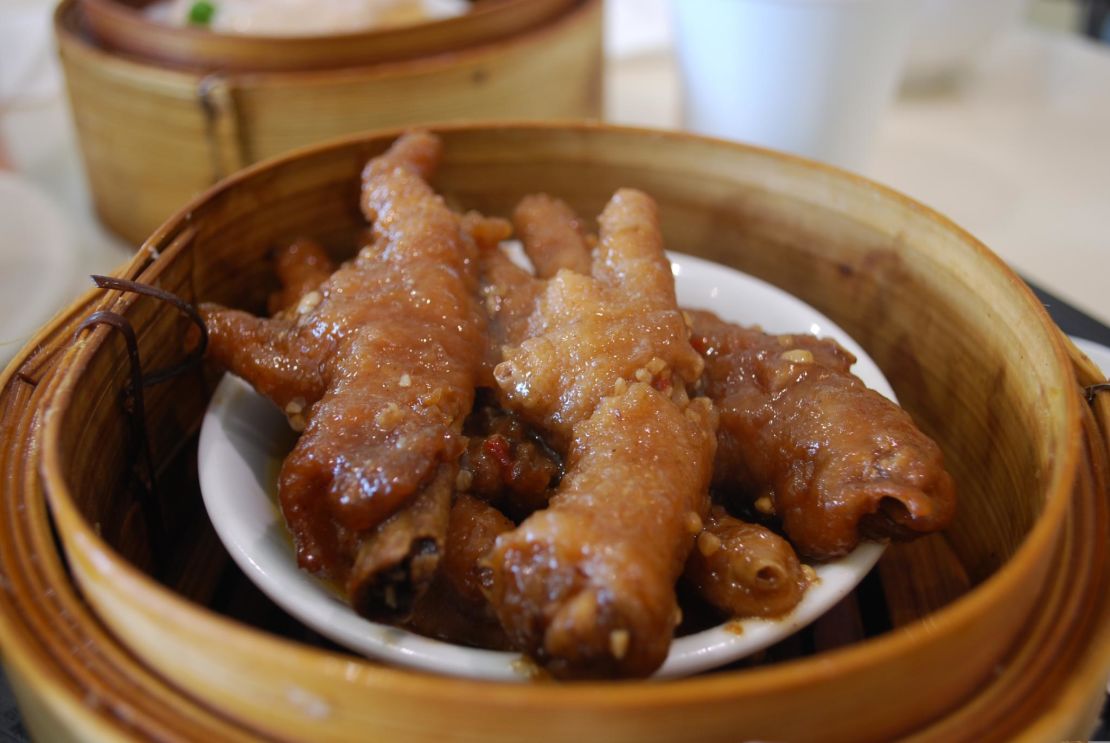
So they look awful, but once you get over that, what is there not to love about chicken feet?
Just like head cheese or coq au vin, Cantonese-style chicken feet are a perfect marriage of thrift and culinary genius. Euphemized as “phoenix talons” in Chinese, chicken feet are typically deep fried then stewed in a black bean sauce.
The cartilage softens to a melt-in-the-mouth consistency and great practice is needed to spit out the little bones in that dainty manner perfected by grandmas in dim sum restaurants across town.
Lei Garden skips the deep-frying and stews their chicken feet in abalone sauce, resulting in a wholesome, more texturized Hong Kong food treat.
Multiple locations, see website for details www.leigarden.hk
10. Indonesian satay
When they’re brought to your table on a miniature charcoal grill, the Shatin Inn’s fatty, tender satay skewers sizzle in a very satisfying way.
But it’s the experience of eating them outdoors in a time-warp restaurant that makes them especially worthwhile.
The Inn is a roadside restaurant that dates back to the days when going to Shatin meant a big journey over the mountains and out to the country. Though it’s now surrounded by roads, it retains a homey, rural atmosphere.
The Shatin Inn, 7.5 Miles, Tai Po Road, Tai Wai, +852 2691 1425
11. Cantonese preserved sausage
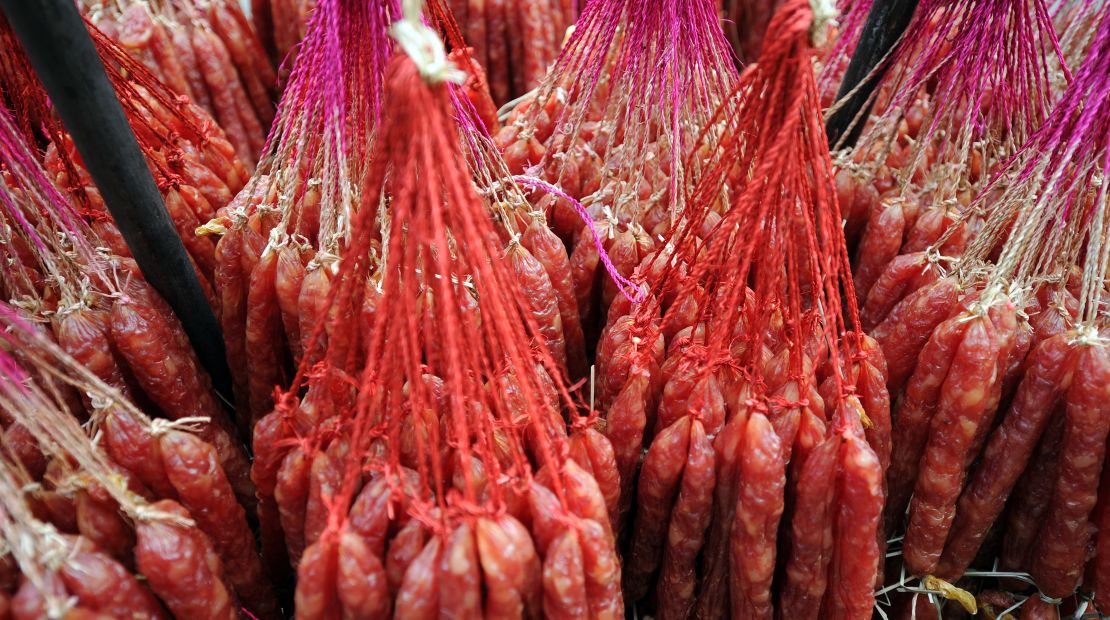
Some Chinese sausages can be heavy on the salt and spices, but Cantonese laap cheung are a perfectly proportioned mix of slightly-sweet pork fat and meat. Rose water and rice wine gives them a pungent edge and soy sauce serves as a salty counterpart to the sweetness.
Cook them with rice, vegetables, eggs or just about anything.
Freshly-dried lap cheung are available in the winter at Wo Hing Preserved Meat, 368 Queens Road Central, Sheung Wan, +852 2546 8958. Frozen-foods specialist DCH (various locations) carries tasty Canadian lap cheung all year round. Or just drop into any of the stores that have sausages on display on Sheung Wan’s “dried seafood street.”
12. Claypot rice
For those willing to turn a blind eye to the two-star service and focus on the five-star signature dish, Kwan Kee Claypot Rice is a must-visit.
With hardly an empty seat ever, Kwan Kee does rice crustily well using charcoal stoves that are near-extinct in Hong Kong food circles.
Whatever toppings you choose, be sure to add some Chinese preserved sausage. All the juices and fat from the meat will drizzle into the rice, adding to its pleasant aroma and taste.
Reservations highly recommended. Kwan Kee Claypot Rice, Shop 1, Wo Yick Mansion, 263 Queen’s Road West, Western District, +852 2803 7209.
13. Trendy hot pot
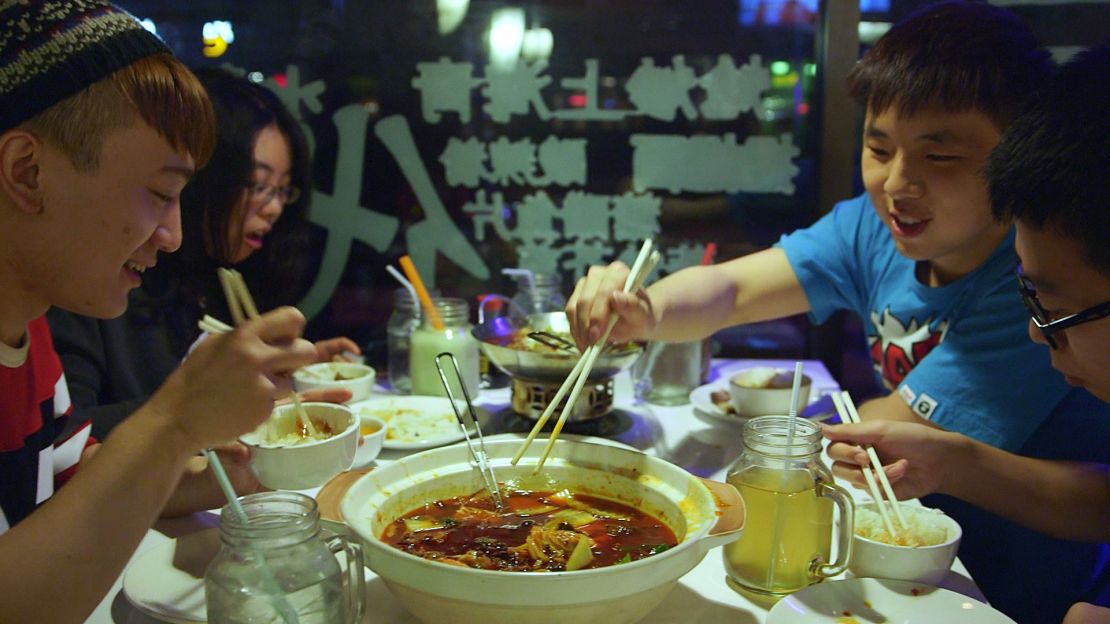
Hot pot is truly a social event and a Hong Kong food tradition, especially for families looking for an excuse to get together on a chilly winter night.
And as a true testament to the innovation and picky palates of Hong Kongers, there’s no shortage of new things to try.
Megan’s Kitchen is one of the latest trend-setting hot pot restaurants famous for their rainbow meatballs in different flavors and colors, where the surprise is inside, like Kinder eggs. Our favorite is Megan’s pork balls with a mango center. Soup base is another divisive issue at the dinner table: from a simple vegetable base to congee and soymilk base to Megan’s tom yum koong “cappuccino.”
Megan’s Kitchen, 5/F, Lok Kei Centre, 165-171 Wan Chai Road, Wan Chai, +852 2866 8305.
14. Hong Kong style-cheeseburgers
Dirt-cheap, kitschy and consistently delicious, Denmark Cake Shop’s Hong Kong-style cheeseburgers are reminiscent of the good old days pre-McD domination.
The rundown eatery’s HK$9 burgers don’t fit the burger archetype, but they’re just as good, if not better: they’re palm-sized, minimalist (ketchup, home-made mayo and half a slice of processed cheese) and are encased in a slightly sweet Hong Kong-style butter roll.
The patty is heavily seasoned and moist, attracting lines of schoolchildren since the shop opened in 1972.
Denmark Cake Shop, G/F, 106 Leighton Road, Causeway Bay, +852 2576 7353.
15. Egg tart
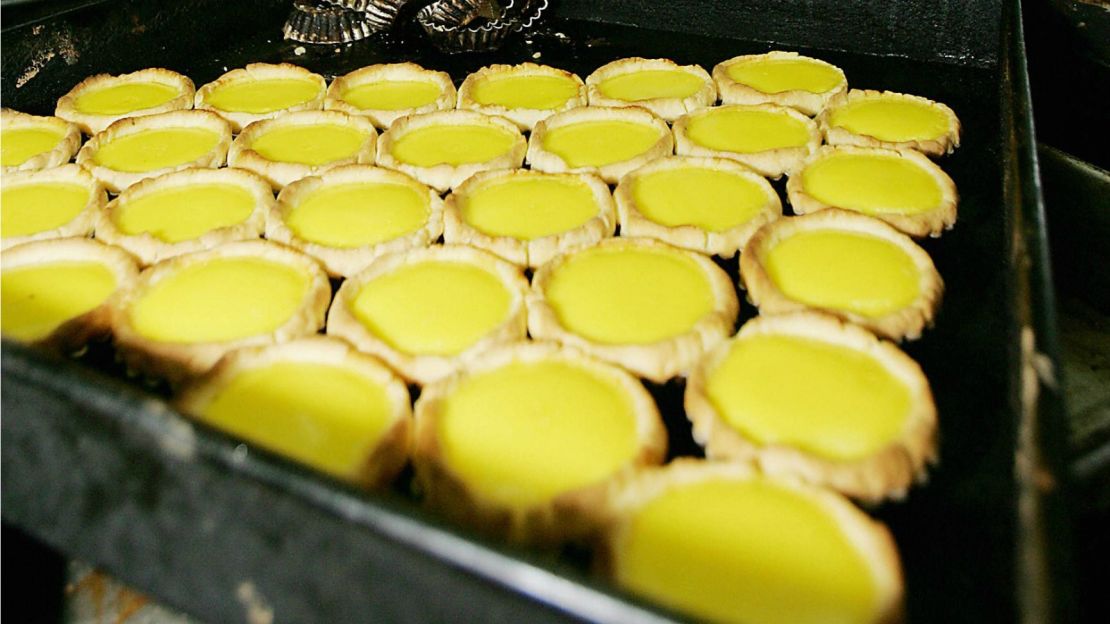
Like many classic Hong Kong food dishes, the origins of the egg tart are a bit murky, but it seems likely that they are yet another example of British tea time snacks – custard tarts, in this case – that were adapted to local Chinese tastes.
Since they became popular in the 1940s, two varieties of egg tarts have emerged: one with a flaky puff pasty shell and another with a sweet shortbread crust. Both are filled with a rich custard that is much more eggy and less creamy than English custard tarts or Portuguese pasteis de nata.
Try the shortbread version at Tai Cheong Bakery, 35 Lyndhurst Terrace, Central, +852 2544 3475, and the flaky kind at Honolulu Coffee Shop, 176 Hennessy Road, Wan Chai, +852 2575 1823, or bump into Chow Yun Fat at his favorite egg tart joint Hoover Cake Shop, 136 Nga Tsin Wai Road, Kowloon City, +852 2382 0383.
16. Ginger milk curd
Spicy, creamy, soupy – this is wintertime dessert at its best (though it’s good in the summer too). Made by gently simmering sweetened milk and then mixing it with fresh ginger juice, which causes the milk to curdle, “geung tsap dun nai” has a soft pudding-like texture not unlike tofu.
Local branches of Macau’s Yee Shun Milk Company make a mean version of this timeless Cantonese treat.
Yee Shun, 506 Lockhart Road, Causeway Bay, +852 2591 1837, and various other locations.
17. Yung Kee’s roast goose
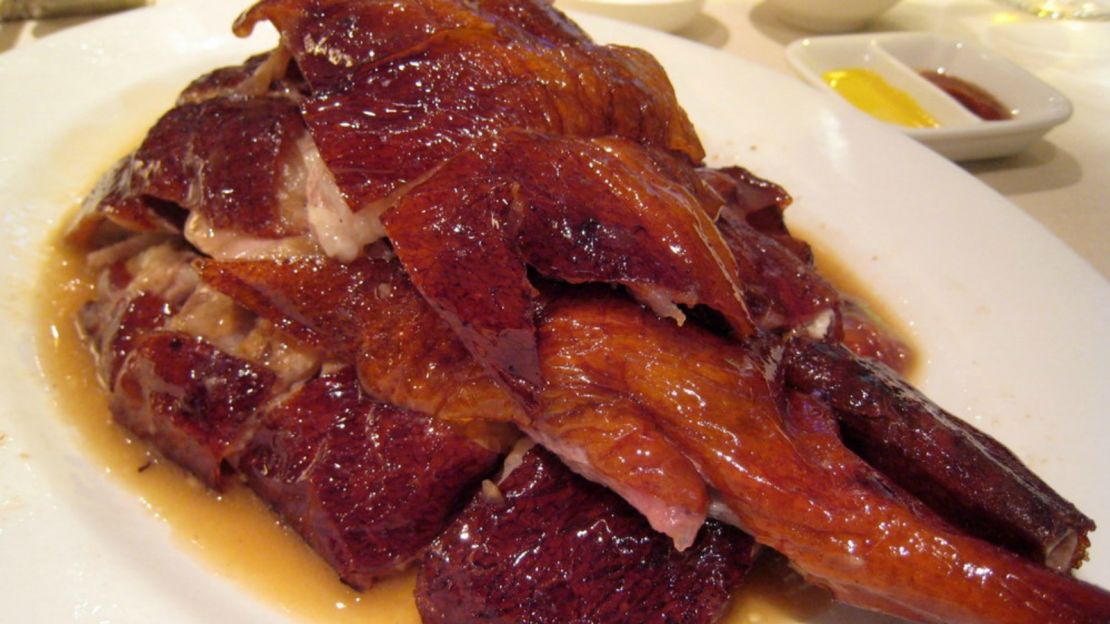
Yung Kee has been around since the 1940s when it was a mere food stall near the ferry pier, and has since grown to be the authority on Hong Kong roast goose.
Today, nine out of 10 people will recommend friends visiting Hong Kong to have a meal at Yung Kee for their “siu ngoh.” The restaurant will even specially pack their goose as carry-on luggage for departing travelers. It isn’t the cheapest by a long way and some may say that the most authentic roast duck is still to be found deep in the New Territories, but its an institution not to be missed.
If you’re inclined, try the equally famous thousand-year egg with ginger, which is so reputable, other restaurants buy from Yung Kee to serve to their own customers.
Yung Kee Restaurant, 32 Wellington Street, Central, +852 2522 1624
18. Beef brisket
Brisket is a much maligned part of the cow in Western cooking, but you’ll find huge chunks of it being slowly stewed in pots of sauce in noodle shop windows all over Hong Kong until they’re tender and soaked with juicy goodness.
Few of these places however, can live up to the reputation of Kau Kee, which sells its signature beef brisket cooked in either a clear broth or curry broth served with noodles. Or try On Lee in Shau Kei Wan on your day off – the good stuff typically sells out by late afternoon.
Kau Kee, G/F, 21 Gough Street, Sheung Wan, +852 2850 5967.
On Lee, Shop 4, G/F, Tung Wong House, 14-22 Shau Kei Wan Main Street East, Shau Kei Wan, +852 2560 6897.
19. Roast pigeon
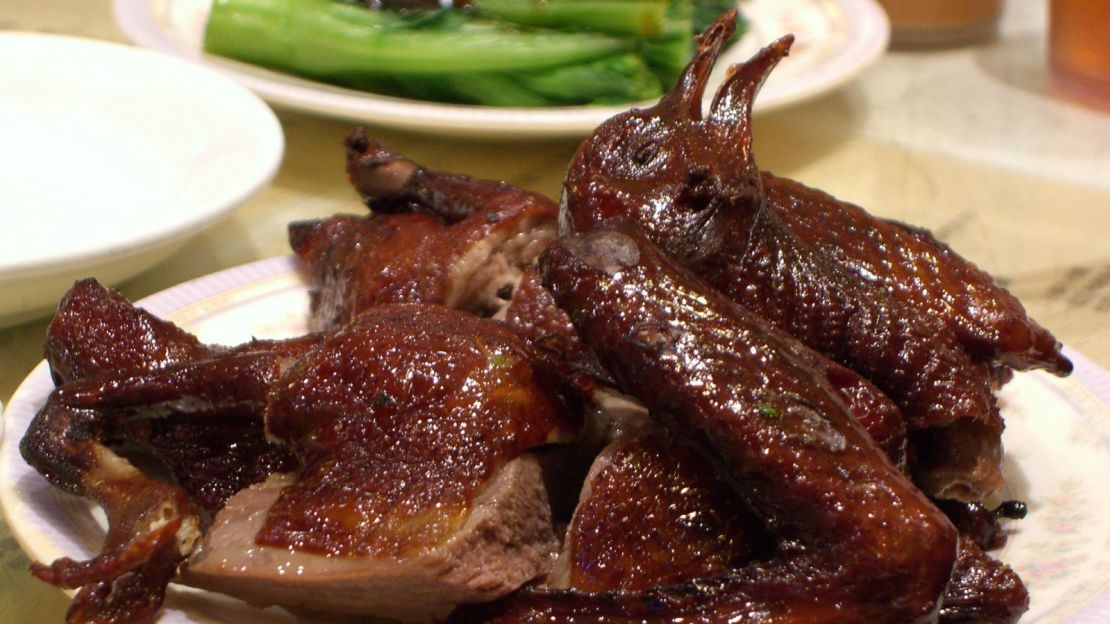
Pigeons are usually dismissed as rats with wings, but believe us, rats don’t taste this good. Cantonese-style pigeon is typically braised in soy sauce, rice wine and star anise before being roasted to crispy perfection.
It’s an earthy, deeply satisfying dish – the Hong Kong answer to Peking duck.
Tai Ping Koon, G/F, No. 60 Stanley Street, Central, +852 2899 2780, and various other locations, are known for their pigeon as are many of the restaurants in Tai Wai.
20. Five-layer roast pork
A great piece of “siu yuk” should have a top layer of crackling skin, then alternating slivers of fat with moist meat, and a final salty-spiced layer at the bottom.
Euphemized as five-layer meat, the morsels are served with sharp yellow mustard to cap off an overwhelming experience of textures and flavors all rendered from a humble slice of pork belly.
Lei Garden’s siu yuk hits the spot every time. Multiple location, see website for details www.leigarden.hk.
21. Snake soup
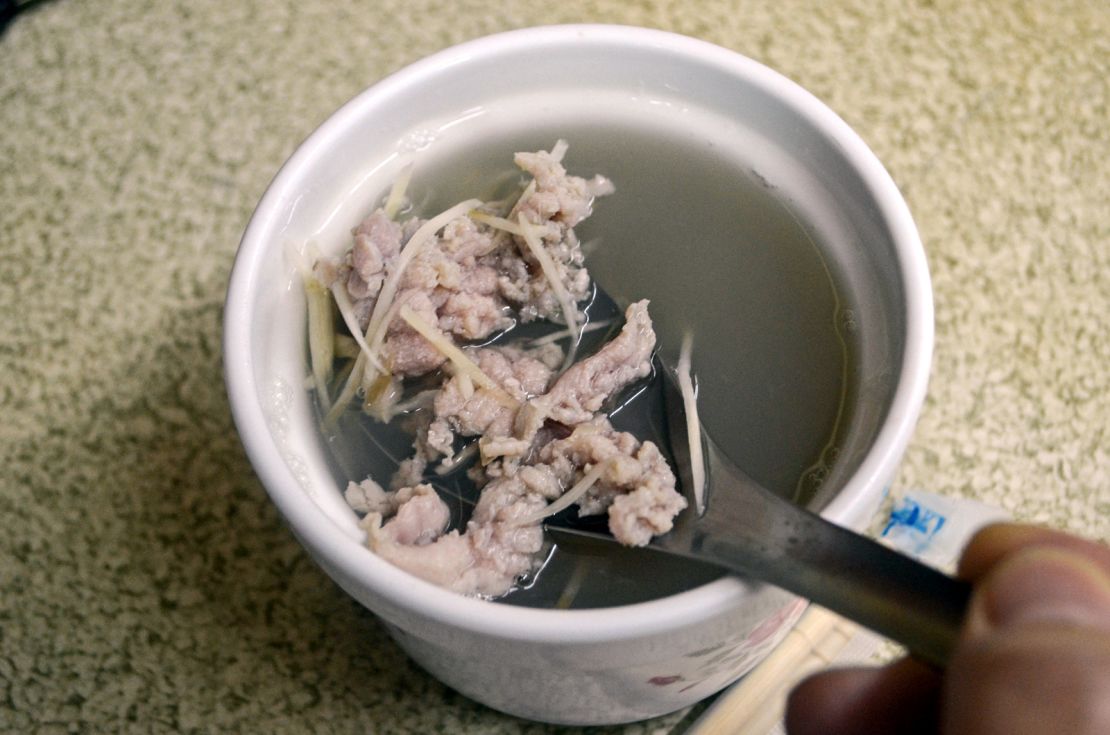
Snake soup is said to cure any number of ailments. Forget about that.
The real reason to indulge in this Cantonese delicacy is because it’s the perfect dish for cool weather.
There’s something about the brothy mix of snake meat, mushrooms, ginger and pork that does an even better job of warming you up than chicken noodle soup.
The soup is usually served with fried bits of dough, slivers of kaffir lime leaf and chrysanthemum petals for aroma. And yes, snake really does taste like chicken.
Give it a go at Se Wong Yan, 80A, Woosung Street, Jordan, no phone.
22. Meat mountain
Steamed meat cake – a mishmash of ground pork, mushrooms, water chestnuts and preserved vegetables, seasoned with simple soy sauce and sesame oil – is a staple of Cantonese home cooking.
At Man Seng, the staple is transformed into something more remarkable: a veritable meat mountain. With feats of culinary magic known only to the cooks (don’t bother asking for details – trade secret), the half-a-foot-high pile of meat is somehow tender, succulent and evenly cooked.
Man Seng, 16 Wun Sha Street, Tai Hang, +852 2576 7272.
23. Typhoon-shelter crab
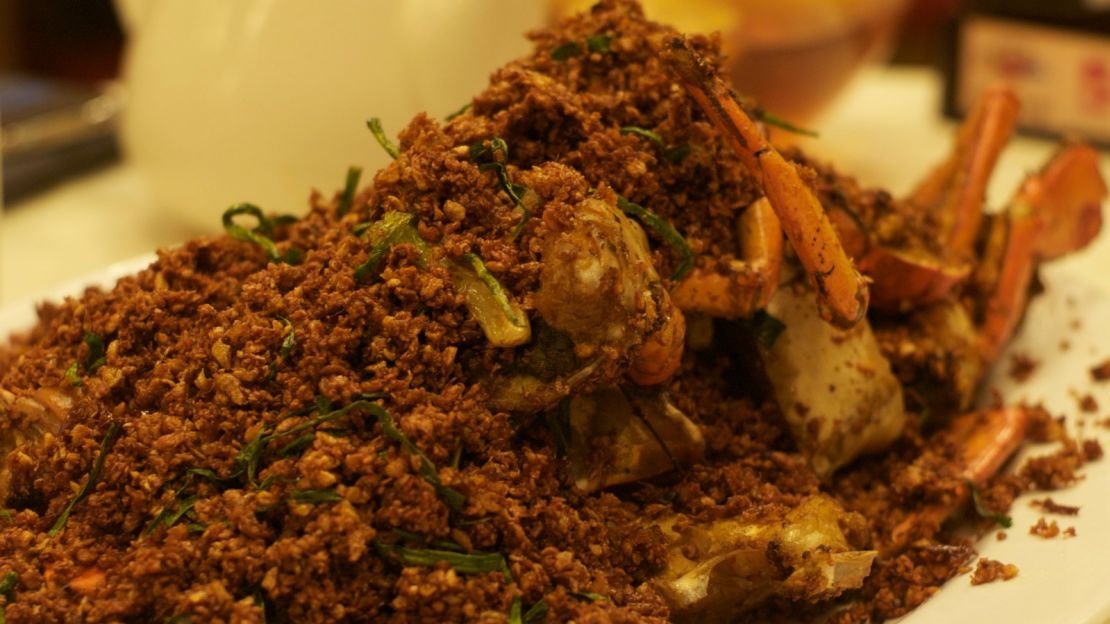
Hong Kong’s typhoon shelters used to harbor a community of “boat people” who made their homes on sampans. Out of the community rose a distinct culinary culture that centered on freshly caught seafood served with plenty of spices and “wok hei” – good wok-wielding skills.
Little remains of Hong Kong’s boat people today but their excellent food culture is ever popular, in particular, the spicy crabs served at Under the Bridge heaped with fried garlic and chilli peppers.
Under the Bridge Spicy Crab, Shop 6-9, G/F, 429 Lockhart Road, Wan Chai, +852 2573 7698
24. North Point Mini Egg Cakes
Crackly on the outside and spongy on the inside, this street-side joint’s mini toasted egg cakes – called “gai daan tsai” – is a clear winner in a city where the snack is just as ubiquitous as potato chips in a convenience store. At North Point Mini Egg Cakes, the eggy batter is toasted to golden-brown perfection and everyone from office workers to housewives crowd around each night for a delicious morsel.
North Point Mini Egg Cakes, 492 King’s Road, North Point, +852 2590 9726
25. Egg noodles
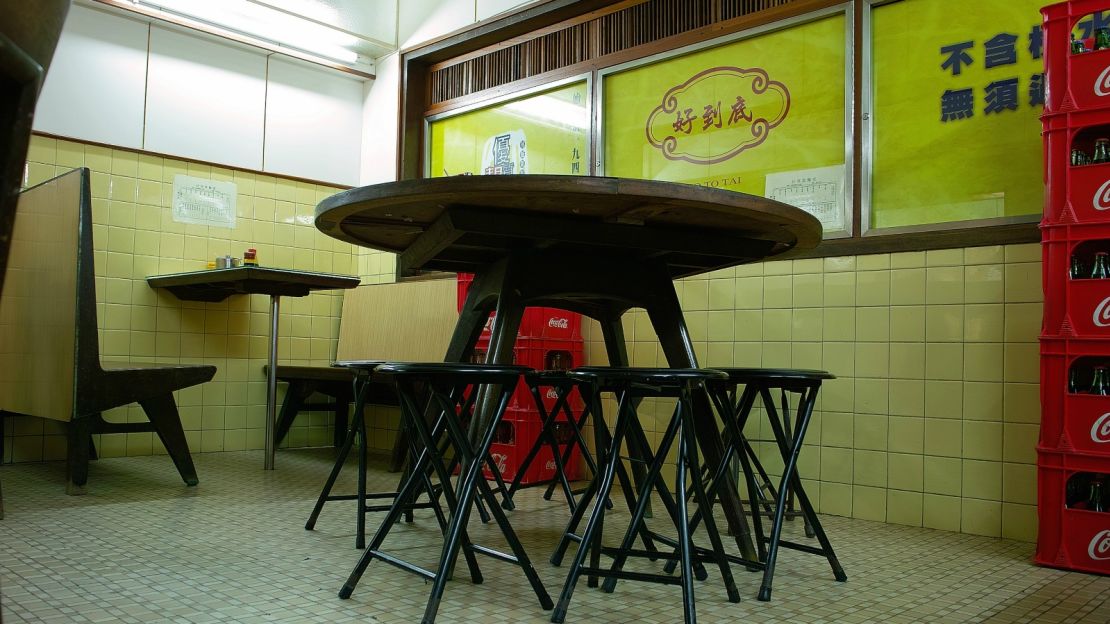
A quality egg noodle depends on its egg flavor and al dente texture.
Egg noodles don’t get much better than at Ho To Tai Noodle Shop, which has been in business for over six decades.
Our favorite is the shrimp roe-covered noodles served with a bowl of fish soup. Salty shrimp roe is generously sprinkled all over strips of noodles that have just the right amount of elasticity and egginess. Ho To Tai’s wontons are also reputable and made to the size of a dollar-coin, as is the tradition.
Ho To Tai Noodle Shop, No.67, Fau Tsoi St, Yuen Long, +852 2476 2495
26. Tang Lung Street’s Thai shrimp sashimi
Dingy Tang Lung Street may not be known as the most savory place to eat raw crustacean dishes in Hong Kong, but Thai Shing Restaurant’s shrimp sashimi has us returning time and time again with no upset tummies so far.
Dished up on a bed of ice and garnished with a slice of raw garlic, the shrimps at Thai Shing are fresh with briny flavors. The chewy delicacy is best eaten dunked in the accompanying chili sauce.
Thai Shing, G/F, Tang Fai Building, 36 Tung Lung Street, Causeway Bay, + 852 2834 2500
27. Milk tea
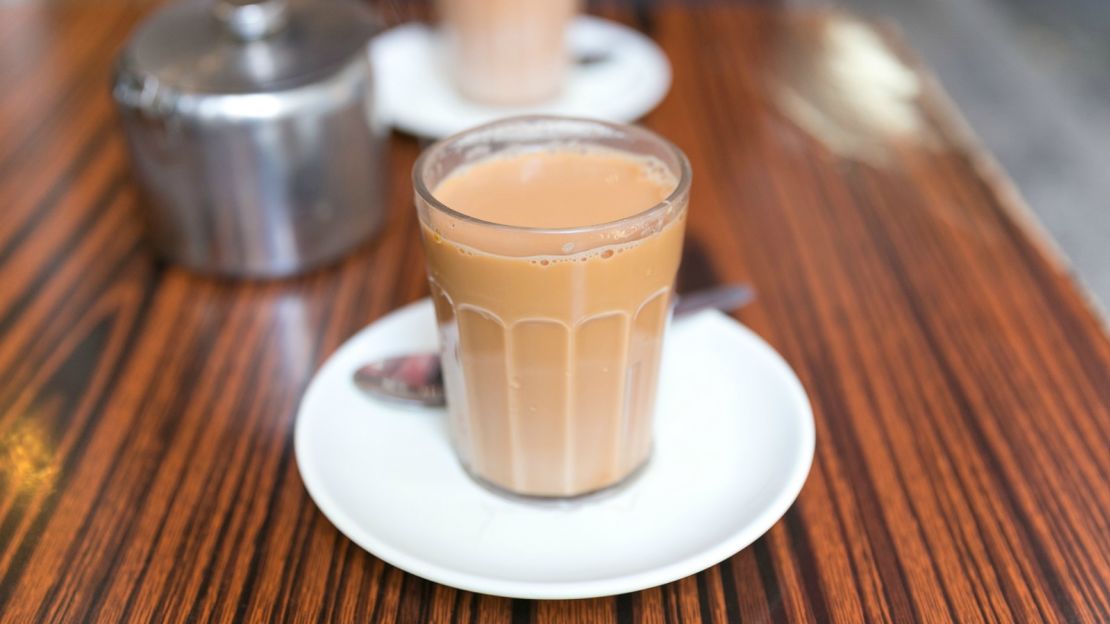
You could argue that afternoon tea is the single most pervasive legacy of British rule, enjoyed as it is by Hong Kongers from all walks of life, and milk tea is the most potent symbol of English traditions fused with Chinese sensibilities.
Top-notch milk tea is made with a special blend of black Ceylon tea that is strained through silk stockings and mixed with evaporated milk. A good cup is bitter, full-bodied and velvety smooth.
Connoisseurs swear by the tea at Kam Fung, 41 Spring Garden Lane, Wan Chai, +852 2572 0526, Lan Fong Yuen’s takeaway stall, 2 Gage Street, Central, +852 2544 3895 and “Milk Tea King” Tai Fat Restaurant, shop 5, G/F, Treasure Court, Hong Shui Kiu, Yuen Long, +852 2443 5533.
28. Mulberry Mistletoe tea
Traditional Chinese medicine rarely tastes this good. Yuen Kee Dessert’s Mulberry Mistletoe tea is a delicately sweet Chinese dessert with medicinal qualities, such as reinforcing the kidney and warding off rheumatism. Mulberry Mistletoe tea’s uncluttered flavor has a quiet, nostalgic charm in a city of frantically evolving food trends.
Most old-timers at Yuen Kee Dessert like to add boiled lotus seeds to their order and pair the sweet tea with a steamed sponge cake.
Yuen Kee Dessert, G/F, 32 Centre Street, Western District, +852 2548 8687
29. Sweet and sour pork
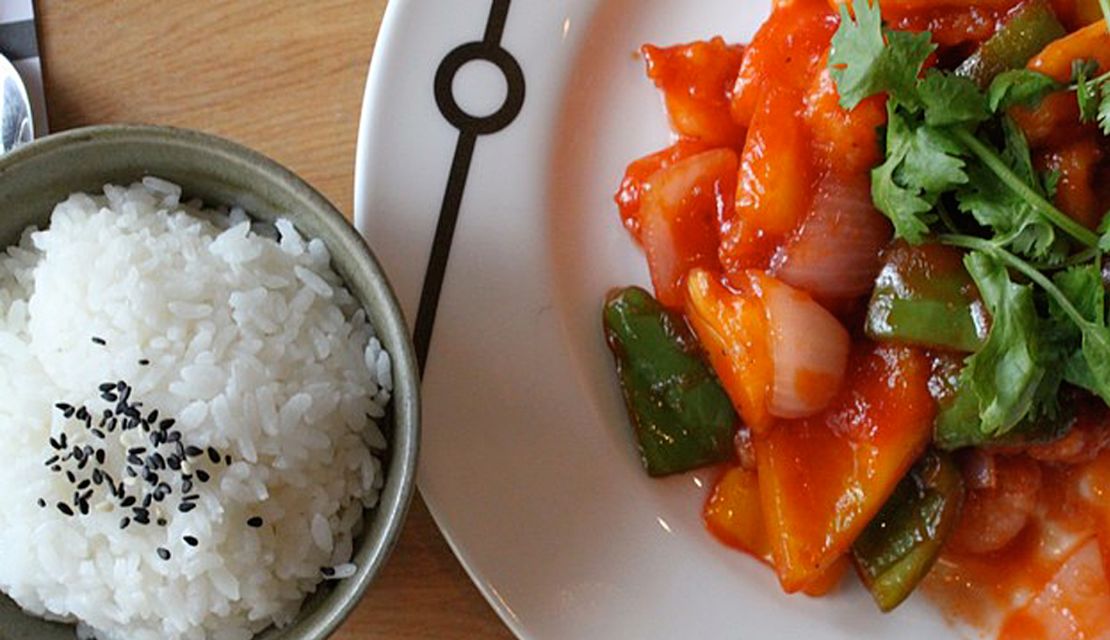
No, it isn’t just for gwailos. Sweet and sour pork, called “gu lo yuk,” is also a comfort food craved by Hong Kongers. The Cantonese original is made with vinegar, preserved plums and hawthorn candy for a nearly scarlet color and that sweet-sour tang. Nowadays, it’s mostly made with ketchup and coloring.
Sweet and sour pork can be ordered at any respectable Canto restaurant, but we like the consistent quality at Ho Choi Seafood Restaurant, multiple locations, see website for details, www.hochoi.com
30. Congee
It’s the Hong Kong food we crave when we’re sick, cold or missing home. And the deciding factor is texture over flavor. Known for its assortment of fresh fish congee, Sang Kee Congee Shop has customers lining up everyday for its fleecy rice porridge boiled from 2a.m. every morning. Portions are large enough to keep an average, middle-aged man satisfied.
Sang Kee Congee Shop, G/F, 7-9 Burd Street, Sheung Wan, +852 2541 1099
31. Joy Hing’s cha siu
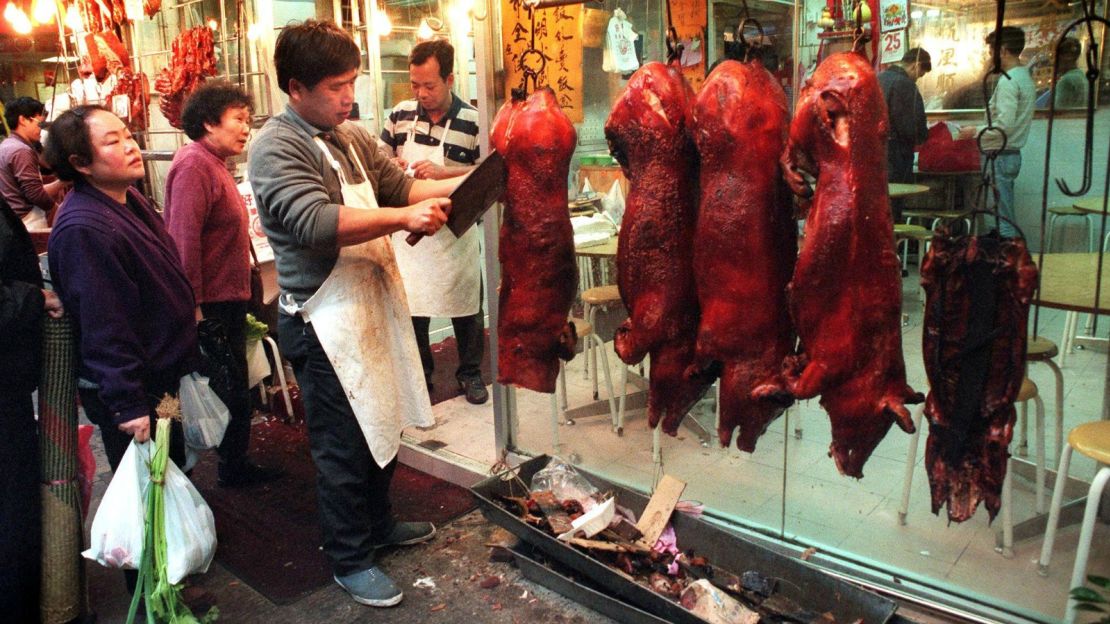
In this town, Joy Hing is synonymous with “cha siu” – Cantonese barbecued pork. Be sure to order “half fatty, half skinny” cha siu for the best cut: moist, not greasy, honeyed yet smoky.
Joy Hing BBQ Shop, 265-267 Hennessy Road, Wan Chai, +852 2519 6639
32. Tonkichi’s tonkatsu
Hong Kongers are thankful for those crazy Japanese and their dedication to perfecting deep-fried comfort food. Tonkichi is the preferred Japanese restaurant in town for deep-fried things, from oysters to giant shrimps – but best of all, pork chops.
Aside from making sure the batter is the perfect crunchiness, the meat inside must be juicy and not greasy. Turn up at Tonkichi with a ravenous appetite and be prepared not to get it back for a couple of days after.
There is usually an hour-long wait for a table. Tonkichi Tonkatsu Seafood, 412, Podium 4, World Trade Center, 280 Gloucester Road, Causeway Bay, +852 2577 6617
33. B Boy’s grass jelly
Kei Kee Dessert sells Hong Kong’s most sought after grass jelly dessert: “B tsai leung fun,” or B Boy’s grass jelly. The huge serving of grass jelly topped with plenty of mixed fruit and condensed milk could be a meal on its own. Go with at least three other people or be prepared to take home your leftovers.
Kei Kee Dessert, Shop 7, Chi Fu Centre, Yuen Long, +852 2479 4743
34. Lotus seed paste
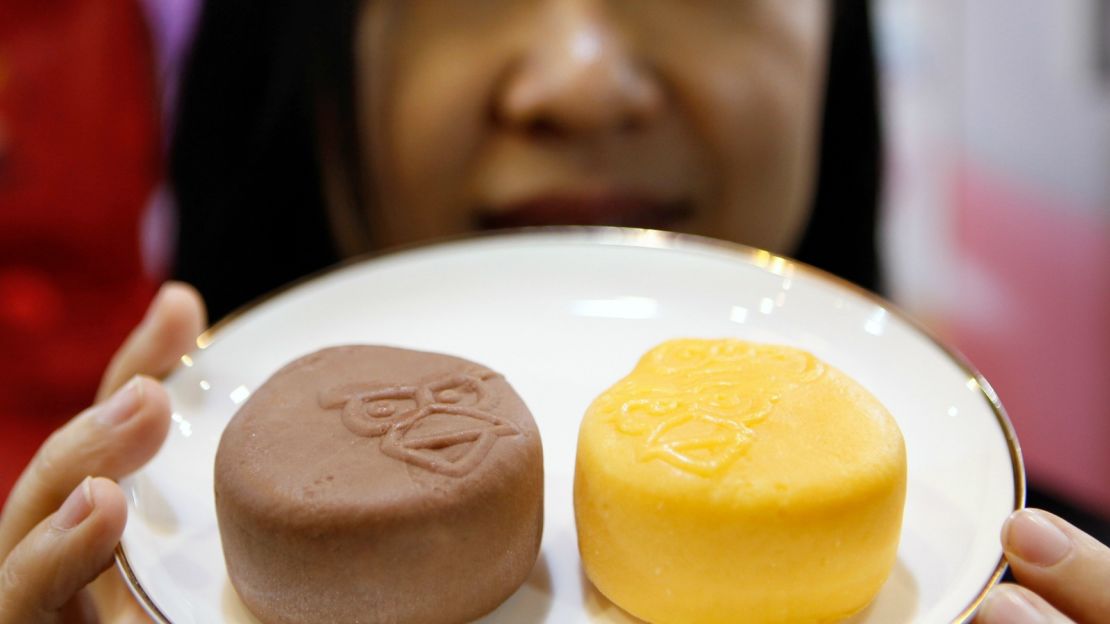
Here’s a lesson in making a silk purse out of a sow’s ear: Take some dried lotus seeds – those hard, pale, dime-sized bullets of little flavor – soak, stew, grind to a paste, pass through cheesecloth, add sugar. Then comes the tricky stage.
Dry-cook the sweetened paste in a huge wok, teasing out the nutty, caramelly flavors without burning it. When done right, the fruit of the exhausting labor is rich, velvety lotus seed paste that can be stuffed in fluffy white buns.
We love the paste stuffed in Lin Heung’s buns with a nub of salty egg yolk.
Lin Heung Tea House, 162 Wellington Street, Sheung Wan, +852 2544 4556
35. Louis’ steak
In Hong Kong there is no shortage of Hong Kong-style steakhouses. Most of these colonial-influenced institutions serve soggy meat on hot griddle plates, their texture horribly mangled by baking powder.
Louis’ Steakhouse has all the nostalgic charms of old-school Hong Kong Western restaurants and none of the bad food. In line with bygone local tastes, their steaks are decidedly more tender than what you find in contemporary Western steakhouses, but is nonetheless juicy and meaty. And you have the bonus of ordering stewed fish maw, another house specialty, alongside your steak.
Now that’s what we call Hong Kong food fusion.
Louis’ Steak House, 1/F, Malaysia Building, 50 Gloucester Road, Wan Chai, +852 2529 8933.
36. Swiss chicken wings
The story goes that a foreigner, bowled over by the wings’ sweet and salty taste, tried to ask the staff for the name of the “sweet” dish. The waiter thought he was alluding to the wings’ Swiss origins and the name stuck. Swiss sauce, a rich, sweet soy sauce, is now a kitchen standby in many Cantonese homes.
Tai Ping Koons’ chicken wings in Swiss sauce is distinctly flavorful, with tender, fall-off-the-bone meat.
Tai Ping Koon Restaurant, 6 Pak Sha Road, Causeway Bay, +852 2576-9161.
37. Mango pudding in mango sauce with extra mango
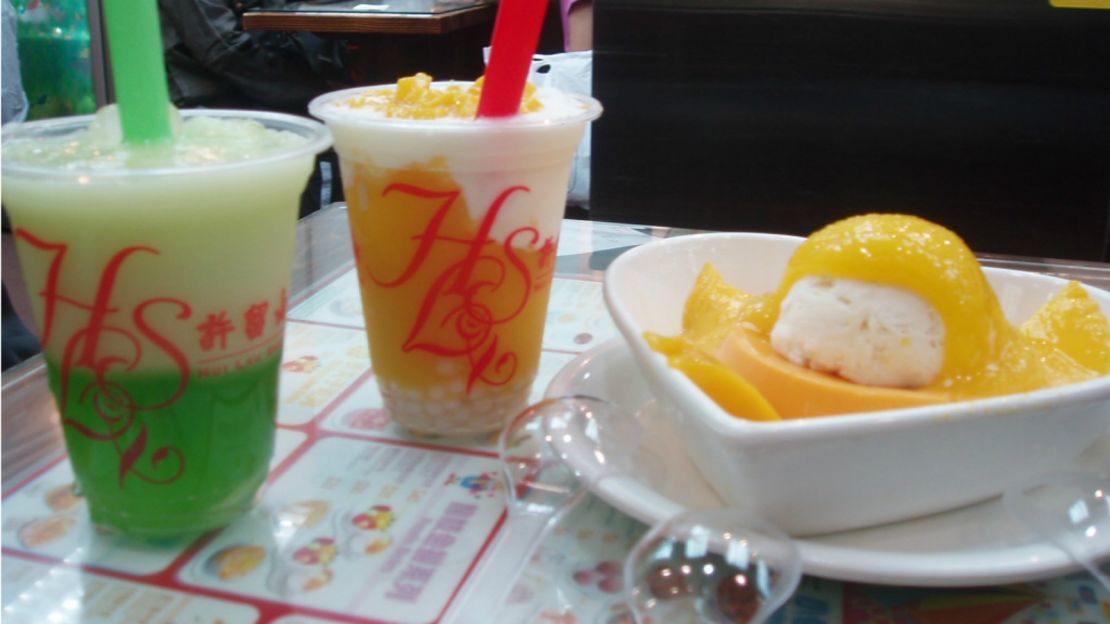
There’s really only one ingredient that matters at Hui Lau Shan: mango. The sweet, ripe fruit, imported from Thailand, finds its way into just about every dish at this dessert chain, which has conquered Hong Kong and spread as far afield as San Francisco.
The shop’s most representative dish combines a milky mango pudding with thick mango puree, mango ice and generous chunks of mango. Extra sugar is left aside in favor of the fruit’s naturally robust sweetness.
Hui Lau Shan, multiple locations, see website for details.
38. Thai food in Kowloon City
Kowloon City was once home to no man’s land Kowloon Walled City but these days it is better known as a food mecca. Some of the best Hong Kong food is found here, particularly Thai food.
A small Thai community makes up Kowloon City’s “Little Thailand,” a proliferation of Thai restaurants, supermarkets and hole-in-the-wall noodle and satay joints.
A lot of the Thai food you find in Hong Kong is overpriced and friendly to expat palates – go for the real thing in Kowloon City.
We like Best of Thai Food Restaurant, 37 Fuk Lo Tsun Road, Kowloon City, +852 2127 7348.
39. Cow Offal
Fatty, richly marinated beef innards are as deeply ingrained in Hong Kong’s street food culture as curry fishballs.
Since Hong Kong’s famed Block 13 outlet closed in 2014, hunting down braised cow offal skewers – a potpourri of contrasting textures, including chewy honeycomb tripe, springy cow lungs, and tough cow’s intestines – is something of a treasure hunt. Luckily, there are still many kerbside stalls still serving this rich vein of street food.
For an extra flavor kick, there’s runny mustard and sweet sauce available at the counter.
Kai Kee Noodle, G/F, 15C Carnarvon Road, Tsim Sha Tsui, +852-23012099.
40. Bowl pudding
For those who miss the 1980s when palm-sized puddings steamed in porcelain bowls (“buut tsai goh”) were widely sold by street hawkers, Kwan Kee Store gives us that taste of childhood we’re craving for.
Since 1965, the Fu family from Shunde has been grinding glutinous rice flour by hand to make their signature bowl puddings with white or brown sugar and sometimes red beans.
Even Hong Kong chief executive Donald Tsang had to make a special visit for a taste.
Kwan Kee Store, Shop 10, 115-117 Fuk Wah Street, Sham Shui Po, +852 2360 0328.
Editor’s note: This article was previously published in 2010. It was reformatted, updated and republished in 2017.



